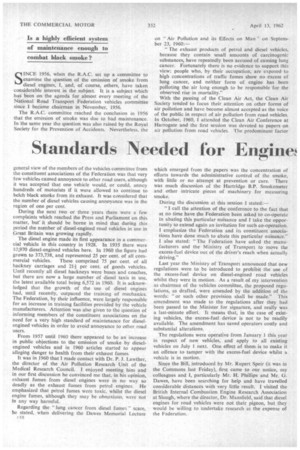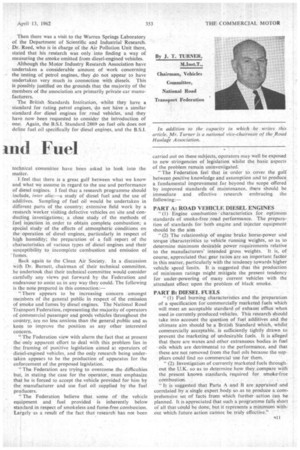S INCE 1956, when the R.A.C. set up a committee to
Page 44

Page 45

If you've noticed an error in this article please click here to report it so we can fix it.
examine the question of the emission of smoke from diesel engines, I, and, of course, others, have taken considerable interest in the subject. It is a subject which has been on the agenda for almost every meeting of the National Road Transport Federation vehicles committee since I became chairman in November, 1956.
The R.A.C. committee reached the conclusion in 1956 that the emission of smoke was due to bad maintenance. In the same year the question was also raised by the Royal Society for the Prevention of Accidents. Nevertheless, the on "Air Pollution and its Effects on Man on September 23, 1960:— " The exhaust products of petrol and diesel vehicles, because they contain small amounts of carcinogenic substances, have repeatedly been accused of causing lung cancer. Fortunately there is no evidence to support this view; people who, by their occupation, are exposed to high concentrations of traffic fumes show no excess of lung cancer, and neither form of engine has been polluting the air long enough to be responsible for the observed rise in mortality."
With the passing of the Clean Air Act, the Clean Air Society tended to focus their attention on other forms of air pollution and have become almost accepted as the voice of the public in respect of air pollution from road vehicles. In October, 1960, I attended the Clean Air Conference at Harrogate and the first session was devoted to papers on air pollution from road vehicles. The predominant factor Then there was a visit to the Warren Springs Laboratory of the Department of Scientific and Industrial' Research. Dr. Reed, who is in charge of the Air Pollution Unit there, stated that his research was only into finding a way of measuring the smoke emitted from diesel-engined vehicles.
Although the Motor Industry Research Association have undertaken a considerable amount of work concerning the testing of petrol engines, they do not appear to have undertaken very much in connection with diesels. This is possibly justified on the grounds that the majority of the members of the association are primarily private car manufacturers.
The British Standards Institution, whilst they have a
• standard for rating petrol engines,. do not have a similar standard -for diesel engines for road vehicles, and they have now been requested to consider the introduction of one. Again, the B.S.I. Standard 2869 on fuel oils does not define fuel oil specifically for diesel engines, and the B.S.I.




















































































































